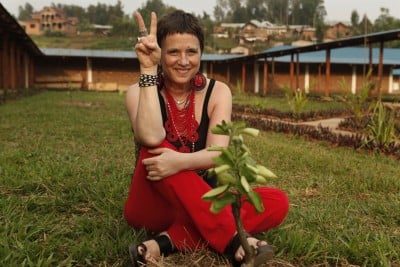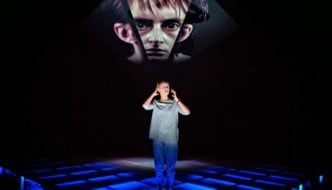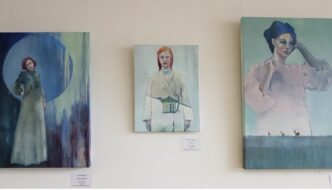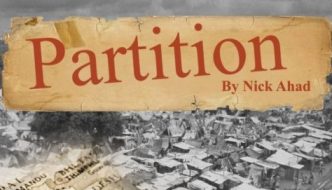Avocados and Vaginas: An Interview With Eve Ensler
May 16, 2015

Image Credit: Paula Allen
Eve Ensler has spoken a lot about her vagina. Her world-renowned play The Vagina Monologues has performed in 140 different countries in over 50 languages and she is a regular speaker for TED, delivering powerful speeches on feminism, sexuality and her relationship with her own body.
But Eve Ensler is no mere provocateur. She’s one of the most influential activists in the fight against violence towards women.
Her movement V-Day has raised over $100 million for abused women and created 12,000 anti-violence programs and safe houses across the world. In 2011 she was awarded the prestigious Isabelle Stevenson Tony Award for her philanthropy and she has had numerous books published on the subject, including the best-selling ‘I Am an Emotional Creature: The Secret Life of Girls Around the World.’
Amidst all this activism, it’s hard to believe Ensler has much time for playwriting, but Leeds is soon to be hosting the world premiere of her latest play Avocado, part of the West Yorkshire Playhouse’s ‘A Play, A Pie and A Pint’ series. Eve Ensler may be a fierce revolutionary, but when TSOTA rings for a chat, she’s engaging, funny and full of good stories.
TSOTA: The Vagina Monologues premiered in 1996 and has found life on stage across the world for almost twenty years. After all this time, are you tired of talking about vaginas?
EE: It’s a total shock – really, darling! (laughs) It’s funny how you get defined by something and, no matter what you do, you’re kind of crystallised in that moment. I think that’s true for a lot of artists; there’s always one play that people go back to. But it’s hard to begrudge The Vagina Monologues, because that play has been such an education for me. I’ve been its student for twenty years, you know? It’s taken me around the world, it’s literally built a movement, V-Day, and it helped give birth to One Billion Rising (a global movement to end rape and sexual violence towards women). I can’t watch it anymore! I can’t bear a word of it – I mean, it’s been twenty years – but I would never want to say that I’m not profoundly grateful for all that play has been. I would like to think that as we go on my work will be recognised as more than that, but it’s really not up to me to determine those things. I just write.
TSOTA: The Vagina Monologues caused a lot of controversy and still provokes strong opinions. Do you think that’s a reflection on American culture and the play would have been received differently if it premiered in Europe?
EE: That’s a very good question. I think the response in every country where the play has been reflects that particular culture. There’s an underlying puritanicalness in America that is not that different to the prudishness of Britain – it just manifests itself in different ways. The French wanted to change the title! With every culture’s response, I’ve felt “That’s how India would respond to it. Oh, of course that’s how Croatia would respond to it.” I think what’s been true across the board is the universal patriarchy, the fear of women ever being born back into complete sexuality and life-force. This manifests itself in different cultural variances, but that’s really what’s going on everywhere.
TSOTA: In the twenty years since you wrote The Vagina Monologues how have you changed as a playwright?
EE: Oh, God. (laughs) I think being an activist and an artist is an interesting contradiction, because so often they are at odds with one another. When you write as an artist you have to clean the palate of your own politics in creating characters and activism is kind of the exact opposite. I think that tension has been a really profound friction over the years. When I was younger I was much more polemical and didactic, much less trusting. Inherently my own vision of the world would weave its way through the characters. Also, my concerns are changing. What happens is you write a few plays and get boxed into some idea of what your concerns are and what you’re supposed to be writing about.
Reaching this age now, I’m feeling a kind of liberty to write about what’s interesting to me without worrying about what I should be writing about. And that feels good.
TSOTA: What can you tell us about your upcoming play, Avocado?
EE: I don’t want to say too much, but I’m really interested in the issues that the play is looking at. I’ve spent a lot of time in the last twenty years looking at struggles of women all over the world. I mean, look at the recent case of Mary Jane Veloso. She was a poor Philipino woman who could not afford to live in the Philippines and feed her family, so she was forced to get work outside of the country and become a migrant worker. She was sent to Egypt where she was almost raped and then fled and, as a result of fleeing, she was trafficked over a border, thinking she was getting a job in Malaysia. When she got to Malaysia, a woman befriended her and said “Look, I think we’ve found you work in Indonesia”. Someone gave her a suitcase and sewed heroin into the suitcase unbeknownst to her. When she got to Indonesia, she was arrested, she went to prison for five years with absolutely no council in any language she could understand and literally four days ago she was about to be executed by a death squad. And we fortunately flew local activists and incredible international support, particularly from the Philippines and Indonesia, who got her execution suspended. That’s one story. That’s one woman. But that story is not an uncommon story for poor, migrant, trafficked women around the world.
TSOTA: So Avocado is Mary Jane Veloso’s story?
EE: No, but it actually happened ironically this week, as we were going into rehearsals. What the play is really looking at is: ‘What goes on inside that person?’ I think so often we don’t see people, we don’t hear people, we don’t know people. Their struggles just aren’t visible to us. This play is trying to really look inside that person whose attempts to get out of a predicament get them thrown into another predicament. It’s a chain. You get further contained and further controlled. The nightmare just gets deeper and deeper. That experience, that’s what I wanted to explore.
TSOTA: How did you get involved with the West Yorkshire Playhouse?
EE: Well, Mark Rosenblatt directed another play of mine in London and I really admired his work and loved working with him. He asked me if I would do a new piece for this particular series (A Play, A Pie and A Pint) and it really excited me, because I really like his artistic vision and I also like that he has a social conscience. And now I think the piece I wrote before and this piece will become a trilogy. The first piece was called Mango and this is called Avocado. Now I’m working on Coconut!
TSOTA: ‘A Play, A Pie and A Pint’ is a very English experience. Will you be in Leeds for the play’s premiere?
EE: No, I’m not. I’m very sad. I would love to be there. Well, you know, when I did The Vagina Monologues at The King’s Head in Islington it was a bit of a ‘pint and a play’ there. It was dinner and a play, so I got the experience!
TSOTA: What’s the best thing you’ve seen at the theatre?
EE: Actually, this week I saw Nirbhaya, the piece about the Indian woman Jyoti Singh who was raped in India and I thought it was really very profound and devastating. A couple of night ago I saw Dael Orlandersmith’s Forever, a piece at New York Theatre Workshop. Both those plays were about sexual violence, but they were rendered very beautifully with gorgeous language and beautiful staging, so I liked both of them very much.
TSOTA: What’s the one biggest change you would like to see in the world?
EE: Oh dear. Wow. It’s early here, darling! (laughs) There are so many. I think so much of neoliberalism and capitalism has caused people to live in a state of greed, fear and consumption that is covering up so much of what we really want. I was watching the protest against the shooting of Freddie Gray in Baltimore in the streets of New York last night and it was really an amazing march. I’ve lived in this city my whole life and I’ve never seen anything like it happen before. Everybody just took over the streets. People were walking in traffic and all the traffic was honking in solidarity. It was just this moment where I felt all of us were in this state of suspended grace and compassion, fighting for the same thing.
We all understood that the ending of police murders of black women and men was all of our concern. We were all in that story together and we were all going to do everything in our power to change the roots of that story, whether it was racism or poverty or lack of education.
Part of that is the recognition that we are not separate and our struggles are completely interdependent.The devastation of neoliberalism is so multi-fold, whether it’s violence against women or desperate economic inequality or the destruction of the planet. There’s a kind of despair that we’re seeing and a somnolence that’s spreading, particularly in the West. We’re all in these isolated doom chambers, as opposed to being in a community of struggle and revolution. Last night, I was like “It is possible! We can do this! We just need to get out of our silos”. I think that would be it, if that isn’t too long-winded an answer!
TSOTA: What’s next on the agenda?
EE: I feel like I’m moving into a time now where I feel some new energy coming to me and I’m very excited about what’s coming next. In a way, I don’t really know what’s happening. I don’t know fully yet what’s emerging and that’s very exciting to me. But it’s going to be new and that feels good. I know I’m being abstract, because life is abstract!
Avocado will be performing at the West Yorkshire Playhouse from 26th to 30th May. Tickets are available here. This play contains adult themes, which some may find distressing. For more on Eve Ensler visit her website www.eveensler.org.
Filed under: Theatre & Dance
Tagged with: Eve Ensler, interview, The Vagina Monologues, West Yorkshire Playhouse



Comments